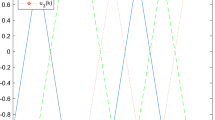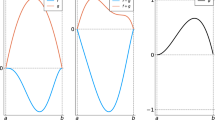Abstract
In this paper, we consider a class of optimal control problems with a cost on changing control, where the system dynamics are described by singular differential equations. Using a constraint transcription coupled with a local smoothing technique, a penalty function, and the control parametrization technique, an efficient computational method is developed for solving this optimal control problem sequentially. The convergence performance of the proposed method is also established. For illustration, this method is used to find the optimal feeding policy for a fed-batch fermentation process.
Similar content being viewed by others
References
Ahmed, N. U.,Elements of Finite Dimensional Systems and Control Theory, Longman Scientific and Technical: Essex, 1988.
Brenan, K. E., Campbell, S. L., and Petzold, L. R.,Numerical Solution of Initial-Value Problems in Differential-Algebraic Equations, North-Holland: New York, 1989.
Bryson, A. E., and Ho, Y. C.,Applied Optimal Control, Halstead Press: New York, 1969.
Carelli, R. and Kelly, R., “Adaptive control of constrained robots modelled by singular systems,”Proc. 28th IEEE Conference on Decision and Control, vol. 3, pp. 2635–2640, 1989.
Cesari, L.,Optimization—Theory and Applications, Springer-Verlag: New York, 1983.
Chen, C. T. and Hwang, C., “Optimal control computation for differential-algebraic process systems with general constraints”,Chemical Engineering Communications, vol. 97, pp. 9–26, 1990.
Dai, L.,Singular Control Systems, Springer-Verlag: Berlin, 1989.
Gear, C. W., “Differential-algebraic equation index transformations”,SIAM J. Scientific and Statistical Computing, vol. 9, pp. 39–47, 1988.
Goh, C. J. and Teo, K. L., “Control parametrization: a unified approach to optimal control problems with general constraints”,Automatica, vol. 24, pp. 3–18, 1988.
Gullun, S. E. and Holland, C. D., “Gear's procedure for the simultaneous solution of differential and algebraic equations with application to unsteady state distillation problems”,Computers and Chemical Engineering, vol. 6, pp. 231–244, 1982.
Hasdorff, L.,Gradient Optimisation and Nonlinear Control, John Wiley:, New York, 1976.
Hindmarsh, A. C., “ODEPACK, a systematised collection of ODE solvers”,Scientific Computing, R. S. Stepleman et al. (Eds.), North-Holland: Amsterdam, pp. 55–64, 1983.
Hong, J., “Optimal substrate feeding policy for a fed batch fermentation with substrate and product inhibition kinetics”,Biotechnology and Bioengineering, vol. 28, pp. 1421–1431, 1986.
Jennings, L. S., Fisher, M. E., Teo, K. L., and Goh, C. J., “MISERS: Solving Optimal Control Problems-an Update”,Advances in Engineering Software and Workstations, vol. 13, pp. 190–196, 1990.
Lewis, F. L., and Fountain, D. W., “Some singular systems applications in circuit theory”,Proc. 1990 IEEE International Symposium on Circuits and Systems, vol. 2, pp. 1380–1384, 1990.
Miele, A., “Gradient Algorithms for the Optimization of Dynamic Systems”, In C. T. Leondes (ed.),Control and Dynamic Systems: Advances in Theory and Applications, Academic Press: New York, pp. 1–52, 1980.
Miele, A., and Wang, T., “Primal-Dual Properties of Sequential Gradient-Restoration Algorithms for Optimal Control Problems, Part 1, Basic Problems”, In F. R. Payne et al. (ed.)Integral Methods in Science and Engineering, Hemisphere Publishing Corporation: Washington, DC, pp. 577–607, 1986.
Miele, A,. and Wang, T., “Primal-Dual Properties of Sequential Gradient-Restoration Algorithms for Optimal Control Problems, Part 2, General Problem”,Journal of Mathematical Analysis and Applications, vol. 119, no. (1-2), pp. 21–54, 1986.
Polak, E.,Computational Methods in Optimization. Academic Press: New York, 1971.
Polak, E., and Maine, D. Q., “A Feasible Directions Algorithm for Optimal Control Problems with Control and Terminal Inequality Constraints”,IEEE Transactions on Automatic Control, vol. 9C-22, pp. 741–751, 1977.
Teo, K. L., and Jennings, L. S., “Optimal control with a cost on changing control,”J. Optimisation Theory and Applications, vol. 68, pp. 335–357, 1991.
Teo, K. L., Goh, C. J., and Wong, K. H.,A Unified Computational Approach to Optimal Control Problems, Longman Scientific Technical: London, 1991.
Teo, K. L., Rehbock, V., and Jennings, L. S., “A new computational algorithm for functional inequality constrained optimisation problems”,Automatica, vol. 29, pp. 789–792, 1993.
Author information
Authors and Affiliations
Additional information
Editor: N. U. Ahmed
Rights and permissions
About this article
Cite this article
Jennings, L.S., Teo, K.L., Rehbock, V. et al. Optimal control of singular systems with a cost on changing control. Dynamics and Control 6, 63–89 (1996). https://doi.org/10.1007/BF02169462
Received:
Revised:
Issue Date:
DOI: https://doi.org/10.1007/BF02169462




